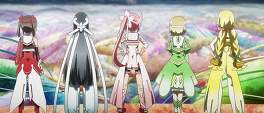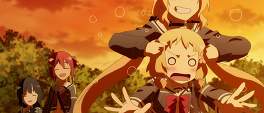Yuki Yuna will never be as popular as Madoka. It’s unfair to compare every magical girl show to that landmark series but Yuki Yuna wa Yusha de Aru (Yuki Yuna is a Hero) doesn’t do itself any favours by trying to cherry pick a lot of the idiosyncrasies that made Madoka so special.
There is, as is now in fashion, the rather mean spirited take on being a magical girl. No longer is it all about having faith in your friends or vanquishing evil doers; there are elements of that but now there’s a price to pay. And it’s not just the tribulations of trying to be a teenage girl and a superhero and having to lie to your family. There’s the abstract, collage-effect enemies that drift menacingly and unknowably, savaging the colourful little pixies that assault it. There’s the music that may not come close to Yuki Kajiura’s haunting score but gives it a good go with some individually stand-out tracks. So it’s business as usual then?
It would be if it weren’t for Mimori Togo. The sole reason I started watching the series, Mimori is in many ways the star despite pint-sized pugilist Yuki Yuna’s name being the one up in lights. Mimori is physically impaired and requires a wheelchair to get about which makes her atypical not only for an anime series, but even more so as a magical girl. Even better, this isn’t some fantasy where Mimori miraculously regains the use of her legs once transformed, instead her magical girl getup works around her, gifting her mobility as well as lethality when it comes to the job of dispatching ne’er-do-wells.
For a while at least, having Mimori present and not the main focus is enough to carry the series, primarily because it normalises her situation which is in many ways a more powerful representation than if this was her story alone. Instead we get spun a yarn about a post-catastrophe society that now worships the Shinju - a mystical tree that supposedly keeps the world together via a nebulously defined organisation, the Taisha. Enter the Hero Club, a school group consisting of Mimori, Yuna, sisters Fu and Itsuki and eventually Karin, all of whom not only help out around the community but also fight off the nefarious Vertex (Vertices?) when they threaten the populace.
Apart from a few tweaks to the formula, this is standard magical girl fare. Don’t want to fight, oh wait now I’m fighting, oh isn’t fighting hard, oh you’re a newcomer, look at us accepting you etc. That is until episode five, when all twelve of the Vertexes have been defeated. Job done then? I guess it’s all beach episodes and bath scenes from here on out.
There’s still the lingering sense of dread that has been skulking in the background up ‘til now though. It might be a natural suspicion nowadays going into a magical girl show but the way that subtle hints are dropped that something malevolent hides beneath the surface is superbly done. Unfortunately the ultimate reveal is less so, the obviousness robbing it of any kind of shock value.
It’s here then that it becomes impossible to fully discuss the show without spoiling it right to the end because where the show excels is in the turn.
So when it is demonstrated that simply fighting as a magical girl robs them, literally, of their faculties and the foreshadowing of Mimori’s disability becomes clear, the poignance of it is immense. There is a genuine sense of body horror with the sickening realisation that these afflictions are permanent, ranging as they do from the heartbreaking loss of Itsuki’s voice through to the inconvenience of Mimori’s loss of hearing in one ear (an affliction I can at least sympathise with). The final battle however hits like a sledgehammer with Karin’s relentless sacrifice agonising to watch, ribbons curling around more and more of her body, and as each girl transforms the aesthetic theme of flowers blooming and shedding their petals (the Sange) seems all the more significant.
The problem comes then with the denouement, once the battle has (somehow) been won and it turns out that all of the girls’ afflictions are in fact going to heal, including Mimori’s original disability. It’s heartwarming to be sure, and hearing Itsuki greet her sister after so many episodes of voice-actress squandering silence brought tears to my eyes; but by providing a happy end to the characters it also rubbishes the original, more potent, message that regardless of your situation you can be accepted and part of the team. Even the bedridden ex-magical girl somehow regrows entire limbs. It’s vexes me to even intimate that the story shouldn’t have had a happy ending, but by doing so its potential is undercut.
It isn’t the only issue either. The more pressing concern comes, again, from Mimori who late in the series not only reveals to Yuki she has negative thoughts while alone, but repeatedly tries to commit suicide only to be stopped by her fairy familiars. Yuki and Fu are so flabbergasted with the information that they are now effectively immortal, the fact that Mimori tried to kill herself over and over again is callously glossed over. It’s a situation that is never adequately resolved or referred to again having been caught up in the maelstrom of the final few episodes that sees the five girl squad convincingly start squabbling amongst themselves.
They do this though because the Shinju (remember that?) is apparently shielding the populace from the ravages of what looks like the surface of the sun, and all it takes is Yuki and co. popping their heads outside of the Shinju’s influence to see that burning hellscape. Only, we’re never told how much of the world the Shinju is protecting - the assumption being just Japan, maybe even just Tokyo, raising the same kind of logistical questions as Tokyo Jupiter does in RahXephon - and yet in a prior battle the world was shown, curvature and all, spread out beneath the battling teens.
It’s not the only inconsistency (Yuna and Togo’s relationship is expanded upon too late, how did the ex-magical girl get outside?) but it is the most egregious and casts doubt as to whether there is a coherent theme to the series. At a base level you could read it is a battle between spiritual beliefs - the Shinju and the Taisha taking aping common Shinto and Buddhist touchstones - and the technologically inclined youth of today - the girls all transform via a smartphone app implying they value their phones more than the trinkets and wands of other genre shows.
Perhaps from a more philosophical viewpoint though the show is about otaku worship of magical girls. So it’s stated that the more the girls fight - effectively the more they are impaired - the more they are worshipped which sounds perversely like the “ultimate moe character” from Welcome to the NHK. From that kind of thought process it’s hard not to see the Shinju’s protection of the girls and Japan as the embodiment of the idealisation portrayed through anime and manga and the Vertex hellscape outside as (rolls dice) Akihabara? It’s a stretch but it definitely seemed like the series had something it wanted to say only it was let down by rough execution.
Which is where the real comparison with Madoka starts and end, because while that franchise was poised on the knife-edge of Shinbo and Shaft’s auteur art style and the pitch perfect character drama, Yuki Yuna was Yusha de Aru is more straightforward and less nuanced. It’s easier to like Yuki, Mimori and friends and easier to empathise with their plight, feeling that Mimori’s ruination of the Shinju is as justified as much as Karin’s gung-ho sacrifice; but in turn it means that the grander themes it seems to grasp at are lost, and the “everyone lived happily ever after” ending fits with the tone but at the expense of memorability.
Make no mistake, the series is worth sticking with beyond the usual fluff, especially so if you’re on the search for some easy, overwrought melodrama. Whether it has ideas above its station is another question, though one that doesn’t impact the series as it’s presented, but can upon reflection leave a sour taste. It is worth championing for Mimori alone with all her wonderful fears and fierceness, but otherwise this is not the stand out blinder of a series it could have been.

















I like Togo's perspective and the fact that they are taking another note from the Madoka franchise and releasing prequel manga about another interesting character. To me, the sacrifice of the faculties was an awesome plot device -- I wouldn't attribute the dark side of things to Madoka specifically though. Anyone that's a fan of fantasy/magic stories in general knows that it tends to be more common that you do pay a price for using magic in some capacity. Especially here, where it is made clear that the God is lending power. Think xxxHolic and all of the other series that focus on Gods and the supernatural as it relates to humans. In many ways, it is much like all of the run-of-the-mill Magical Girl series, but the basic plot devices are not quite the same.
Overall, the series felt a little rushed. The pacing was good at the beginning somewhat, though I wasn't a huge fan of the way they fell into just being amazing at combat automatically (I'm not looking for Hunter x Hunter training arcs, but you know, at least a half episode of getting your ass kicked and another half for training). I was willing to let that go until they transformed before there was danger (which I assumed they couldn't do). This series could easily have been 20+ episodes and while I usually applaud creators for knowing when to quit, this time they didn't do it right. It could have been a money thing since the anime was the beginning of the franchise (which is the opposite for most series these days), I'm not sure, but all of the talk about the Shinju and the Taisha was confusing because the information wasn't complete. My thoughts are that they are giving this information in Togo's prequel, since that makes the most sense, but it would have been nice to see it here.
I was very unsatisfied with the ending because the victory wasn't explained. It was nice that they all got healed (and I was relieved that the ending was happy) but it would have been more satisfying if they had more clearly explained what happened to the world (they kind of did, but it was lack luster -- maybe it was lost in the translation, but I doubt it ) before the Shinju took over and what exactly they did to fix it.
I don't really know that the series was trying to have a higher message, but if any, I would equate it to military recruitment. They often trick young men and women into signing, up, not making it extremely clear what they are getting themselves into. Obviously, it's a more straightforward than in this series, but that's my closest guest.
After saying all that, I do plan to post a full review on my site soon, if you wish to take a look at that some time later and criticize my views ^_^